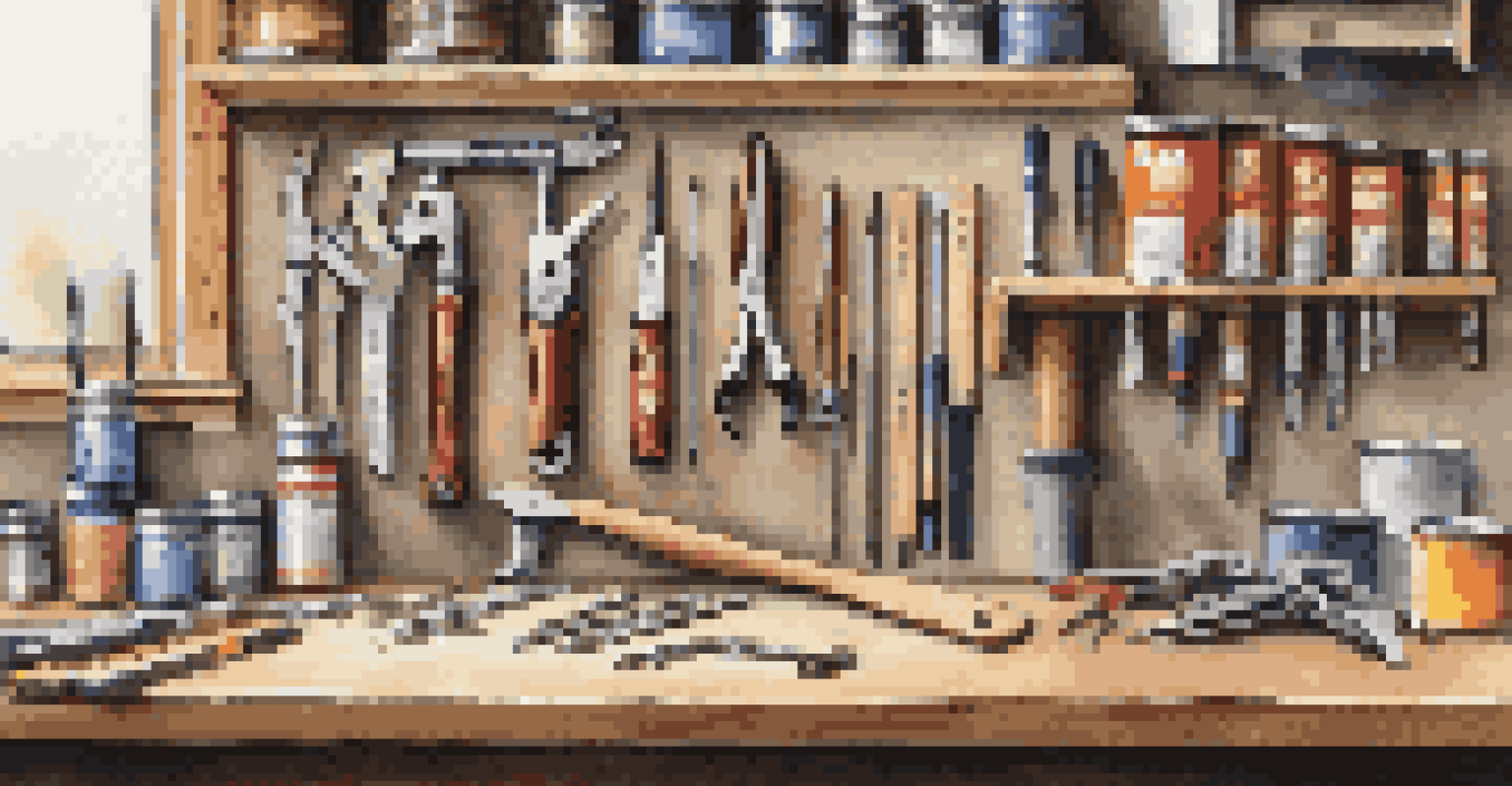Home Maintenance Checklist: Understanding Common Repairs Needed

Understanding the Importance of Home Maintenance
Home maintenance is crucial for preserving the value and safety of your property. Just like a car needs regular oil changes, your home requires consistent upkeep to function efficiently. Neglecting small issues can lead to significant problems down the line, often costing more in repairs than a regular maintenance routine would.
An ounce of prevention is worth a pound of cure.
Think of your home as a living entity. It breathes, ages, and sometimes, like us, it needs a little TLC. By understanding the importance of maintenance, you can not only enhance your living environment but also create a sense of pride in your home.
Establishing a maintenance checklist helps you keep track of tasks and prioritize them effectively. This proactive approach can save homeowners time, stress, and money, allowing you to enjoy your home to the fullest.
Seasonal Maintenance Tasks to Consider
Seasonal changes bring different challenges for homeowners, making it essential to adapt your maintenance tasks accordingly. For instance, fall is the perfect time to clean gutters and check for any drafts before winter sets in. Spring, on the other hand, is ideal for inspecting your roof and checking for any signs of wear and tear from the harsh winter months.

By breaking down maintenance tasks by season, you can create a more manageable schedule. This way, you won't feel overwhelmed with too many chores at once, and you'll have clear goals to focus on throughout the year.
Home Maintenance is Essential
Regular home upkeep preserves property value and prevents costly repairs.
Consider creating a seasonal calendar that outlines these tasks. It's a simple and effective way to stay organized while ensuring that your home remains in top condition all year round.
Common Repairs to Watch Out For in Your Home
Every homeowner will inevitably face common repairs, and being aware of them can help you act quickly. Some of the most frequent issues include leaky faucets, squeaky doors, and drafty windows. These may seem minor, but they can lead to larger problems if not addressed promptly.
The bitterness of poor quality remains long after the sweetness of low price is forgotten.
For example, a leaky faucet not only wastes water but can also lead to mold growth if it goes unchecked. By being vigilant and addressing these issues early, you can avoid escalating repair costs and maintain a comfortable living environment.
Keeping a close eye on these common repairs can also empower you to tackle them yourself, saving you the expense of hiring professionals for minor fixes.
Tools Every Homeowner Should Have for Repairs
Having the right tools on hand can make a world of difference when it comes to home repairs. A basic toolkit should include a hammer, screwdrivers, pliers, a tape measure, and a level. These essential tools will allow you to handle most minor repairs without needing to call in a professional.
Think of your toolkit as your home’s first aid kit. Just as you wouldn't want to be caught without band-aids, you don’t want to be unprepared for that pesky loose cabinet door or a picture frame that needs hanging.
Seasonal Tasks Improve Efficiency
Adapting maintenance tasks to seasonal changes creates a manageable schedule for homeowners.
As you gain experience, you might consider adding more specialized tools to your collection. Building your toolkit over time will equip you to tackle a wider range of repairs confidently.
Preventative Maintenance: Saving Time and Money
Preventative maintenance is the practice of addressing potential issues before they escalate into costly repairs. Regularly checking your home’s systems, such as your HVAC and plumbing, can help catch problems early, saving you both time and money. This proactive approach minimizes the risk of surprise breakdowns, which can be both inconvenient and expensive.
Imagine your home as a car; you wouldn't wait for the engine to fail before getting an oil change. Similarly, establishing a routine for preventative maintenance can keep your home running smoothly and efficiently.
By scheduling regular inspections and maintenance tasks, you create a safer and more enjoyable living environment. It’s a small investment of time that pays off greatly in the long run.
Hiring Professionals vs. DIY Repairs: When to Decide
One of the biggest dilemmas homeowners face is whether to tackle repairs themselves or hire a professional. DIY repairs can save money and give you a sense of accomplishment, but some tasks require professional expertise to ensure safety and compliance with local codes. Analyzing the complexity of the repair can help you make this decision.
For example, changing a light fixture or unclogging a sink might be manageable for most homeowners, but dealing with electrical issues or extensive plumbing requires a licensed professional. Assessing your skills and comfort level is key to making the right choice.
Documenting Repairs is Beneficial
Keeping a detailed record of repairs enhances organization and can attract potential buyers.
Ultimately, knowing when to call in the pros can save you from costly mistakes and ensure the job is done right. Don't hesitate to seek help—after all, it's what professionals are there for!
Documenting Repairs and Maintenance History
Keeping a detailed record of repairs and maintenance can be incredibly beneficial for homeowners. Not only does it help you track what has been done, but it also provides valuable information for future reference. When it comes time to sell your home, having a well-documented maintenance history can be a selling point for prospective buyers.
Think of it as a health record for your home. Just as you keep track of your medical history, documenting repairs can give you insight into recurring issues and help you make informed decisions about future maintenance.

Consider creating a digital or physical binder that organizes receipts, warranties, and maintenance logs. This practice will keep you organized and prepared for any potential home inspections down the line.
Staying Educated: Resources for Home Maintenance
Staying informed about home maintenance is vital for every homeowner. Fortunately, there are countless resources available, including online tutorials, home improvement blogs, and local workshops. These resources can empower you with knowledge and skills to tackle repairs confidently.
For example, YouTube is an excellent platform for finding step-by-step videos on a variety of home repair topics. Watching a professional guide you through the process can make even the most daunting tasks feel manageable.
Additionally, consider joining local community groups or forums focused on home improvement. Networking with fellow homeowners can provide support, share experiences, and offer tips that can make your maintenance journey smoother.